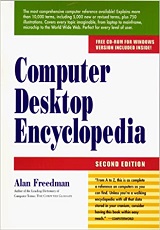
|
FreeComputerBooks.com
Links to Free Computer, Mathematics, Technical Books all over the World
|
|
- Title: Computer Desktop Encyclopedia
- Author(s) Alan Freedman
- Publisher: Osborne/McGraw-Hill; 9th edition (September 24, 2001); eBook (2014, Updated Continuously)
- Paperback: 1124 pages
- eBook: HTML and PDF
- Language: English
- ISBN-10: 0072193069
- ISBN-13: 978-0072193060
- Share This:

|
This desktop encyclopedia contains more than 10,000 terms, which are explained accurately and lucidly. There 800 illustrations that are used to show devices and clarify concepts.
The expansive, "encyclopedic" format of the book makes it possible to explain concepts and historical background at whatever length is necessary, as opposed to abbreviated and dictionary definitions.
Buzzwords and acronyms are explained and phonetically pronounced, while information on the latest topics and trends in the Internet, graphics, media, and devices is also uncluded.
New terms, Big Data, Cloud Computing, etc. are added continuously
About the Authors- N/A
- Computer Hardware, Personal Computers, and the History of Computers
- Computer System, Organization, and Architecture
- Computer Science

- Computer Desktop Encyclopedia (Alan Freedman)
- The Mirror Site (1) - PDF
- The Mirror Site (2) - PDF (1471 pages)
- The Mirror Site (3) - PDF (1471 pages)
- The Mirror Site (4) - PDF
-
 Basic Computer Architecture (Smruti R. Sarangi)
Basic Computer Architecture (Smruti R. Sarangi)
This book is a comprehensive text on basic, undergraduate-level computer architecture. It includes the combinational units, ALUs, processor, basic 5-stage pipeline, and a microcode-based design.
-
 Help! My Computer is Broken (How do I Fix It?)
Help! My Computer is Broken (How do I Fix It?)
This book takes the most common computer problems and tells you how to fix them. It’s as simple as that! If you’ve ever wondered why your laptop won’t turn on, you can’t get a WiFi connection, your printer isn’t printing, or why everything is so slow ...
-
 How Computers Work: Processor and Main Memory, 2nd Edition
How Computers Work: Processor and Main Memory, 2nd Edition
This book starts out very simple and gets more complex as it goes along, but everything is explained. The processor and memory are mainly covered. It explains in great detail the operation of a simple but functional computer.
-
 The Official Raspberry Pi Beginner's Guide (Gareth Halfacre)
The Official Raspberry Pi Beginner's Guide (Gareth Halfacre)
With this straightforward, easy to follow guide, aspiring programmers can now learn the craft without feeling overwhelmed and develop cool gadgets and complex robots - this book was written to show you just how easy it is to get started.
-
 Retrograde - The Ultimate Guide to Pre-millennial PC Hardware
Retrograde - The Ultimate Guide to Pre-millennial PC Hardware
This book not only covers the inner workings of loads of the hardware and software from the 1980s and 1990s, but also shows you how to build your own retro PC with a modern twist and also emulate DOS on Raspberry Pi.
-
 Computer Repair with Diagnostic Flowcharts, 3rd Edition
Computer Repair with Diagnostic Flowcharts, 3rd Edition
This book presents a visual expert system for diagnosing component failure and identifying conflicts. The seventeen diagnostic flowcharts at the core of this book are intended for the intermediate to advanced hobbyist, or the beginning technician.
-
 Build a Computer from Scratch (Jeff Heaton)
Build a Computer from Scratch (Jeff Heaton)
It takes you through all of the steps to create a powerful computer system. It contains over 120 photographs to guide you through the process, includes sample designs for computer systems that emphasize such uses as gaming, video editing, etc.
-
 PC Architecture (Michael Karbo)
PC Architecture (Michael Karbo)
This guide is written in easy language and contains a lot of illustrations. The author would like to give you enough insight into and confidence about your PC's workings that you would dare to upgrade your PC, or build your next PC yourself.
-
 The Brain of the Computer (Jim Buchanan)
The Brain of the Computer (Jim Buchanan)
The purpose of the book is to take a basic computer system and show you how every part works. It is taught from a technicians point of view, not an engineer's. It covers electronic components, logic circuits, CPU, computer system, assembly language, etc.
-
 The Computers That Made Britain (Tim Danton)
The Computers That Made Britain (Tim Danton)
The story of 19 of those computers - the tales of missed deadlines, technical faults, business interference, and the unheralded geniuses who brought to the UK everything from the Dragon 32 and ZX81, to the Amstrad CPC 464 and Commodore Amiga.
-
 Code: The Hidden Language of Computer Hardware and Software
Code: The Hidden Language of Computer Hardware and Software
Using everyday objects and familiar language systems such as Braille and Morse code, the author weaves an illuminating narrative for anyone who's ever wondered about the secret inner life of computers and other smart machines.
-
 How To Assemble A Desktop PC (Wikibooks)
How To Assemble A Desktop PC (Wikibooks)
Building a computer can be a very rewarding experience. Since you're reading this, you're probably thinking about building your next computer instead of buying one pre-built. Beginning from picking the parts, structuring, and so on to turn into an ideal PC.
-
 Understanding Computers, Smartphones and the Internet
Understanding Computers, Smartphones and the Internet
This book is for people who would like to understand how computers work, without having to learn a lot of technical details. Only the most important things about computers are covered. There is no math except some simple arithmetic.





